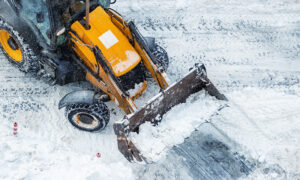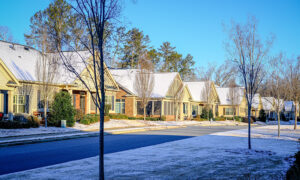Who is responsible for HOA snow removal in Ohio? Many state laws, local legislation, and city ordinances mandate snow and ice removal in public walkways and sidewalks adjacent to properties. However, whether the homeowner, association, landlord, or tenant is responsible depends on several factors.
HOA Snow Removal Policy in Ohio
Unlike many other states, Ohio does not require homeowners to shovel natural accumulations of ice and snow. The Ohio Supreme Court maintained this position in December 1993 when a guest slipped and fell outside the homeowner’s Franklin County home. They attempted to file a lawsuit against the homeowner.
However, while the state does not place a legal obligation to shovel sidewalks on residents, homeowners should still try to maintain these roads. Homeowners may still be liable if someone sues them for accidents over walkway irregularities and cracks. They may also be liable if a person slips on ice formed due to improperly positioned downspouts.
In addition, certain local municipalities do include ordinances involving snow removal. Hence, the homeowners are responsible for HOA snow removal in Ohio if the HOA is within a town or city that requires residents to keep walkways clear of ice and snow. Moreover, some cities in the state may issue warnings or impose penalties for not removing ice and snow promptly. On the other hand, these ordinances don’t immediately implicate homeowners when somebody slips or falls on property with uncleared snow.
Who Is Responsible for HOA Snow Removal in Ohio?
Is the HOA responsible for snow removal? If the homeowners are responsible — and the homeowner is a landlord — are landlords responsible for snow removal in Ohio? As previously mentioned, it depends on the town’s or city’s local ordinances.
For example, the city of Columbus states that property owners are responsible for clearing ice and snow off the sidewalks on or around their properties. However, residents cannot shovel snow onto streets and city roadways. In addition, the city’s Snow Warriors may also plow residential streets when there is considerable snowfall of 4 inches or more.
Furthermore, it discourages homeowners associations from contracting with private snow removal companies within the city’s rights-of-way. This is because HOA snow removal in Ohio, more specifically Columbus, could damage private and public property. As a result, the homeowners association may be held liable for the cost of damages. The HOA should, therefore, leave the responsibility of plowing in the city’s rights-of-way to the city.
Apart from local ordinances, homeowners associations should look to their community’s governing documents for reference. Some governing documents will place the responsibility of snow removal entirely on the HOA. Meanwhile, many will often require the HOA to only maintain common areas — and thus, only remove snow in those places. As a result, individual homeowners are responsible for snow removal on and around their properties.
Finally, the responsibility of HOA snow removal in Ohio rentals may depend on the lease contract. These contracts often outline who maintains certain parts of the rental property. Sometimes, the landlord is responsible for maintaining the entire property and removing ice or snow. Meanwhile, some contracts place the responsibility on the tenant’s shoulders.
The Importance of Snow Removal
 Homeowners associations may be tempted to leave the snow to pile up without local ordinances and provisions in the governing documents. However, letting the snow be is generally not a good idea. This is because snow build-up on walkways and driveways can cause accidents. If someone slips or falls in the HOA’s common areas, this can lead to liability. Snow build-up can also hinder homeowners from accessing their property or passing through community areas.
Homeowners associations may be tempted to leave the snow to pile up without local ordinances and provisions in the governing documents. However, letting the snow be is generally not a good idea. This is because snow build-up on walkways and driveways can cause accidents. If someone slips or falls in the HOA’s common areas, this can lead to liability. Snow build-up can also hinder homeowners from accessing their property or passing through community areas.
Moreover, maintenance is a part of the HOA board’s fiduciary duty to the community. The board must make decisions in the neighborhood’s best interests. Snow removal services may be costly, but they’re necessary to protect the HOA residents. Letting them pile up could also damage HOA property and ruin landscaping. This could be even costlier in the long term as the HOA must hire vendors to redo landscaping, fix roads, and repair common areas.
Best Snow Removal Practices
Homeowners associations should make it a point to adopt a good snow removal policy to protect the community. Here are some tips your HOA can follow.
1. Create a Snow Removal Policy
HOA snow removal in Ohio is tricky as the state doesn’t have general laws in place. Nonetheless, HOAs should create snow removal policies that clarify the responsibility of the HOA and the homeowners. Will the HOA offer snow plowing services to the entire community? Do homeowners need to shovel their walkways and driveways? When and how often should the HOA or homeowners clear the snow?
Moreover, HOAs should include other guidelines when it comes to snow removal. If the homeowners are responsible, remind them that they should cooperate with the rest of the community. They should refrain from pushing snow onto roads or other people’s property. The homeowners should also report potential hazards immediately.
2. Hire a Professional Company
If the HOA is responsible for snow removal, it’s best to hire professionals to do the job. These companies often have the right experience, equipment, and expertise to remove snow from public spaces. They know how to pre-treat snow and have the right insurance coverage. Consider allotting a budget specifically for snow removal as winter approaches.
3. Winterize Community Property
To avoid any complications that come with winter, it’s best to winterize the community’s property before the snow falls. Remember to winterize pipes, inspect HVAC systems, maintain building exteriors, and clean what needs to be cleaned before winter.
A Critical Responsibility
 The policies for HOA snow removal in Ohio may be murky as the state doesn’t have specific requirements or policies regarding snow removal. As a result, HOAs must turn to the governing documents and the city or town’s local ordinances for guidance. Homeowners associations must clarify these responsibilities to avoid accidents and potential liability during the winter.
The policies for HOA snow removal in Ohio may be murky as the state doesn’t have specific requirements or policies regarding snow removal. As a result, HOAs must turn to the governing documents and the city or town’s local ordinances for guidance. Homeowners associations must clarify these responsibilities to avoid accidents and potential liability during the winter.
HOA management is no easy task. Why not ask for professional help from Elite Management Services? Call us today at (855) 238-8488 or contact us online to request a proposal!
RELATED ARTICLES:
- Is An HOA Informal Meeting Allowed? Is It Illegal?
- Can Your HOA Tow Cars Parked On The Streets?
- What Is HOA Proxy Voting? What Are The Rules Around It?







